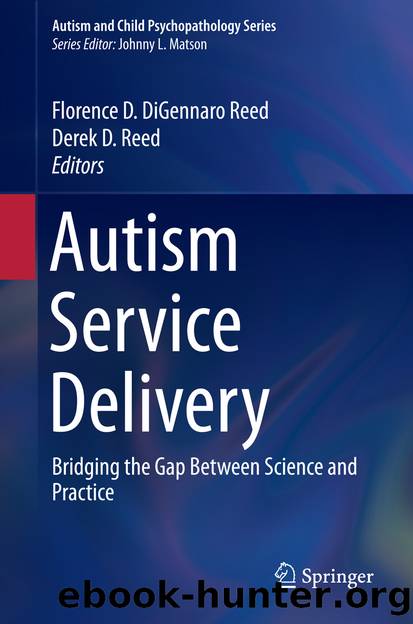Autism Service Delivery by Florence D. DiGennaro Reed & Derek D. Reed

Author:Florence D. DiGennaro Reed & Derek D. Reed
Language: eng
Format: epub
Publisher: Springer New York, New York, NY
8.5.2 Exchange Production
The exchange-production schedule is arguably the most important determinant of behavior maintained by a token economy in application—largely due to the fact that it is most likely to be manipulated and placed on an intermittent schedule, and it therefore describes how token production responding is ultimately related to the terminal reinforcer. In application, exchange-production requirements are commonly arranged as a ratio such that a fixed number of tokens must be procured prior to exchange for backup items (e.g., Fox et al. 1987; Henson II 1975). While more common in school or home settings, the use of exchange intervals—in which tokens earned during production periods cannot be exchanged until some delay period has elapsed—has also been employed in practice (e.g., Dalton et al. 1973).
The effects of different exchange ratios and intervals on response rates and patterning have a fairly extensive history of study in the basic laboratory; results from every generic schedule have been reported upon (e.g., Wolfe 1936; Webbe and Malagodi 1978). After one or more tokens have been produced, exchange periods can be precluded either by blocking access to an exchange receptacle (Wolfe 1936) or by training a discrimination between periods of exchange availability versus nonavailability (e.g., Kelleher 1957; Malagodi 1967a). General results from these studies echo those reported for schedules of token production in that exchange-production responding conforms to schedule-typical patterning found with access to primary reinforcers. Indeed, since exchange-production requirements indicate temporal proximity to terminal reinforcers (if token exchange is held constant), effects of these schedules have been shown at times to override those programmed in token-production components (e.g., Bullock and Hackenberg 2006; Waddell et al. 1972). Results from several representative studies will be described below, along with implications for what these results suggest for best arranging token-production and token-exchange schedules in application.
Download
This site does not store any files on its server. We only index and link to content provided by other sites. Please contact the content providers to delete copyright contents if any and email us, we'll remove relevant links or contents immediately.
I Capture the Castle by Dodie Smith(2040)
The Heavy by Dara-Lynn Weiss(1811)
Aspergirls by Rudy Simone(1700)
Be Different by John Elder Robison(1650)
Autism's False Prophets by Paul A. Offit(1539)
My Child's Different by Elaine Halligan(1518)
Smart but Scattered—and Stalled by Richard Guare(1501)
101 Tips for the Parents of Boys with Autism by Ken Siri(1495)
Asperger Syndrome (Autism Spectrum Disorder) and Long-Term Relationships by Ashley Stanford(1427)
What's Making Our Children Sick? by Michelle Perro(1417)
ADHD by Mark Selikowitz(1394)
Girlish by Lara Lillibridge(1390)
On Immunity: An Inoculation by Biss Eula(1364)
An Adult with an Autism Diagnosis by Gillan Drew(1355)
Nerdy, Shy, and Socially Inappropriate by Cynthia Kim(1352)
Animal-assisted Interventions for Individuals with Autism by Temple Grandin(1332)
The Cities by K.A Knight(1317)
Sarah's Child (Hqn Romance) by Linda Howard(1315)
Seeing Ezra by Kerry Cohen(1307)
